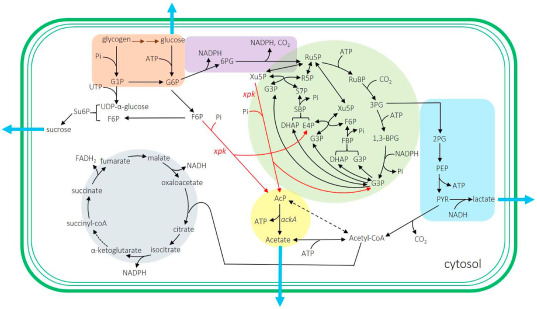
 中央研究院 生物化學研究所
中央研究院 生物化學研究所
Primary metabolism in cyanobacteria is built on the Calvin-Benson-Bassham (CBB) cycle, oxidative pentose phosphate (OPP) pathway, Embden-Meyerhof-Parnas (EMP) pathway, and the tricarboxylic acid (TCA) cycle. Phosphoketolase (Xpk), commonly found in cyanobacteria, is an enzyme that is linked to all these pathways. However, little is known about its physiological role. Here, we show that most of the cyanobacterial Xpk surveyed are inhibited by ATP, and both copies of Xpk in nitrogen-fixing Cyanothece ATCC51142 are further activated by ADP, suggesting their role in energy regulation. Moreover, Xpk in Synechococcus elongatus PCC7942 and Cyanothece ATCC51142 show that their expressions are dusk-peaked, suggesting their roles in dark conditions. Finally, we find that Xpk in S. elongatus PCC7942 is responsible for survival using ATP produced from the glycogen-to-acetate pathway under dark, anaerobic condition. Interestingly, under this condition, xpk deletion causes glucose secretion in response to osmotic shock such as NaHCO3, KHCO3 and NaCl as part of incomplete glycogen degradation. These findings unveiled the role of this widespread enzyme and open the possibility for enhanced glucose secretion from cyanobacteria.
